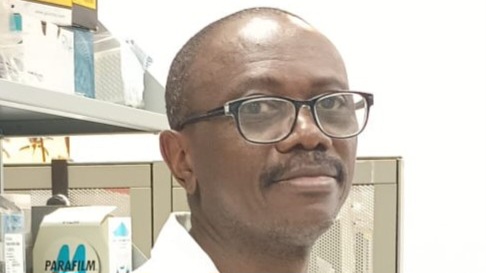 In the field of biomedical sciences, a researcher’s effort is illuminating new possibilities in treating various diseases. Dr. Adekunle Rowaiye, a distinguished Nigerian scientist presently carrying out his research in the United States, has made notable progress in uncovering the beneficial bioactivities of indigenous Nigerian plants for potential disease treatments, laying the groundwork for enhanced therapeutic approaches. Dr. Rowaiye is a consultant veterinarian and pharmaceutical biotechnologist, specialising in the discovery, design, and assessment of drugs, including natural products, small molecules, peptides, vaccine antigens, and antibodies.
In the field of biomedical sciences, a researcher’s effort is illuminating new possibilities in treating various diseases. Dr. Adekunle Rowaiye, a distinguished Nigerian scientist presently carrying out his research in the United States, has made notable progress in uncovering the beneficial bioactivities of indigenous Nigerian plants for potential disease treatments, laying the groundwork for enhanced therapeutic approaches. Dr. Rowaiye is a consultant veterinarian and pharmaceutical biotechnologist, specialising in the discovery, design, and assessment of drugs, including natural products, small molecules, peptides, vaccine antigens, and antibodies.
He consistently aims to collaborate with fellow researchers and practitioners, engaging in translational research endeavors to identify novel drug targets and develop products for disease prevention and treatment, leveraging his expertise in the field.
Dr. Adekunle Rowaiye, a Fellow of the Postgraduate College of Veterinary Surgeons of Nigeria specialising in clinical pharmacology, has made a substantial impact on Nigeria’s scientific community.
His research has delved into the therapeutic capabilities of approximately 80 Nigerian plants, encompassing fruits, vegetables, mushrooms, and spices.
“My main drive comes from wanting to tackle the existing gaps in the health care system and play a part in creating new therapies that can help our people. We are constantly confronted with a major challenge posed by the emergence and re-emergence of diseases.
I am confident that by utilizing the resources available locally, we can make substantial progress in pushing forward drug discovery research within our own borders,” he explained.
His doctoral dissertation in pharmaceutical biotechnology centered on assessing certain natural compounds with anti-cancer properties and their effects on the activating receptors of Natural Killer Cells, specialized immune cells crucial for antiviral and antitumor activities. In this study the anti-inflammatory and immunomodulatory potential of Gongronema latifolium (Bush buck plant), known as ‘Utazi’ in the Southeastern and ‘Arokeke’ in the Southwestern parts of Nigeria was brought to bear. The hot water extract from Gongronema latifolium leaves demonstrated a significant ability to inhibit certain pro-inflammatory cytokine (biomolecules that promote inflammation) in rabbits without causing liver toxicity.
These results suggest potential for safer indigenous options compared to Nonsteroidal Anti-Inflammatory Drugs (NSAID) in managing inflammatory conditions.
In a separate rabbit study, Dr. Rowaiye and his team emphasise the protective properties of the hot water extract from Pleurotus Ostreatus (oyster mushroom) against renal injury and bone marrow suppression (reduced production of blood cells) induced by the cancer chemotherapy drug cyclophosphamide. This suggests that Pleurotus Ostreatus, a commonly consumed Nigerian mushroom, has the potential to serve as an adjunct therapy to alleviate the adverse effects of cyclophosphamide in cancer treatment. Furthermore, Dr. Rowaiye and his team conducted research on Pleurotus tuberregium, commonly known as the King Tuber Mushroom or Usu in Southeastern Nigeria. Their findings revealed its ability to enhance cholesterol metabolism and address obesity concerns.
On his drug discovery efforts during the COVID-19 pandemic, Dr Rowaiye says “in 2020, our team was the first to computationally discover and publish that Ellagic acid, derived from Garcinia kola (commonly known as bitter kola), could inhibit the main protease enzyme of the SARS-CoV-2 virus. Despite lacking funds to continue the research at that time, we had strong confidence in our findings due to Ellagic acid’s established efficacy against the SARS-CoV-1 virus in experimental studies. Moreover, the availability of Ellagic acid as a supplement suggested that drug development timelines could be expedited. Much later, our work was confirmed by another research group.
Through computational modelling, Dr. Rowaiye and his team additionally showcased that Nigerian plants contain numerous bioactive compounds with inhibitory effects against various molecular targets in the SARS-CoV-2 virus, a topic on which he extensively published his findings.
He stands out prominently on academic and research networking platforms like ResearchGate and Google Scholar. Over the course of five years, he has authored over 50 publications, comprising journal articles, book chapters, and conference papers, with a primary focus on discovering therapeutic molecules from indigenous plants and bioresources. Some of the subjects of interest covered by these articles include the medicinal value of marine green algae, earthworms, soybeans, mushrooms, black seed, and the basil plant.
Dr Rowaiye opines that today’s drug discovery methods have enhanced our focus on identifying the precise compounds within these bioresources that exhibit antioxidative, anti-inflammatory, and other beneficial properties. Our goal is precision—to isolate the effective components while eliminating any that may be ineffective or harmful.
Dr. Rowaiye’s contributions to the scientific community, including nominations for several honorary doctorate degrees and active participation in scientific conferences, have significantly enhanced Nigeria’s standing in global research. His role as a peer reviewer for many articles across different international journals demonstrates his commitment to upholding scholarly rigor and advancing knowledge. Moreover, Dr. Rowaiye’s mentorship of young scientists and training of many interns from various Nigerian universities further enriches and strengthens the Nigerian research landscape.
Dr. Rowaiye’s profile reflects a unique blend of expertise in medicine and biomedical sciences, showcasing his versatility. His extensive publications demonstrate his commitment to staying abreast of the latest advancements and technologies that augment his field. Dr. Rowaiye emphasises drug discovery is an amalgamation of several fields and he beliefs in micro-credentialing, highlighting his dedication to continuous learning through scientific literature and collaborations with field experts.
Dr. Adekunle Rowaiye is conducting groundbreaking research in America that could directly benefit Nigeria. His focus includes exploring molecules that would retard the aging process and reduce the incidence of neurodegenerative and other age-related diseases. He is also presently evaluating an onco-vaccine candidate for colorectal cancer. This research not only contributes to global scientific advancements but also holds promise for significant medical breakthroughs that can positively impact healthcare in Nigeria.











